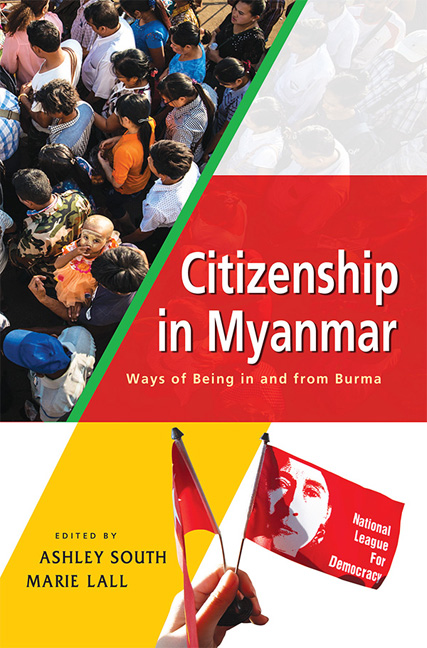Book contents
- Frontmatter
- Dedication
- Contents
- Foreword
- The Contributors
- Map of Myanmar
- Introduction
- 1 Ethnic Politics and Citizenship in History
- 2 Representation and Citizenship in the Future Integration of Ethnic Armed Actors in Myanmar/Burma
- Special Contribution: The Way Forward for Peace, Stability and Progress in Burma/Myanmar
- 3 National Political Dialogue and Practices of Citizenship in Myanmar
- 4 Citizenship and Minority Rights: The Role of “National Race Affairs” Ministers in Myanmar's 2008 Constitution
- Special Contribution: Karenni People at a Glance
- 5 Myanmar's Youth and the Question of Citizenship
- Special Contribution: I Am a Citizen of Myanmar
- 6 “The Value of Life”: Citizenship, Entitlement and Moral Legibility in Provincial Myanmar
- Special Contribution: How I Became Shan
- 7 Conflict and Mass Violence in Arakan (Rakine State): The 1942 Events and Political Identity Formation
- 8 Exploring the Issue of Citizenship in Rakhine State
- Special Contribution: Rohingya and Nationality Status in Myanmar
- 9 Myanmar's Other Muslims: The Case of the Kaman
- Special Contribution: Interview with P'doh Kweh Htoo Win
- Index
Introduction
Published online by Cambridge University Press: 28 June 2018
- Frontmatter
- Dedication
- Contents
- Foreword
- The Contributors
- Map of Myanmar
- Introduction
- 1 Ethnic Politics and Citizenship in History
- 2 Representation and Citizenship in the Future Integration of Ethnic Armed Actors in Myanmar/Burma
- Special Contribution: The Way Forward for Peace, Stability and Progress in Burma/Myanmar
- 3 National Political Dialogue and Practices of Citizenship in Myanmar
- 4 Citizenship and Minority Rights: The Role of “National Race Affairs” Ministers in Myanmar's 2008 Constitution
- Special Contribution: Karenni People at a Glance
- 5 Myanmar's Youth and the Question of Citizenship
- Special Contribution: I Am a Citizen of Myanmar
- 6 “The Value of Life”: Citizenship, Entitlement and Moral Legibility in Provincial Myanmar
- Special Contribution: How I Became Shan
- 7 Conflict and Mass Violence in Arakan (Rakine State): The 1942 Events and Political Identity Formation
- 8 Exploring the Issue of Citizenship in Rakhine State
- Special Contribution: Rohingya and Nationality Status in Myanmar
- 9 Myanmar's Other Muslims: The Case of the Kaman
- Special Contribution: Interview with P'doh Kweh Htoo Win
- Index
Summary
Since 2011, Myanmar has been going through a period of profound — albeit still contested — transition. Under the leadership of President U Thein Sein, the country experienced widespread if sometimes uneven reforms, including the release of most (but not all) political prisoners, a greatly improved environment for freedom of speech and association, a resurgence of the civil society sector, some economic reforms, and the start of a peace process between the government (and Myanmar Army, or Tatmadaw) and some two dozen ethnic armed organizations (EAOs) which had long been fighting for greater autonomy from the militarized and Bama-dominated central government.1 This has been an unprecedented period of transition, which continued following the November 2015 elections, and April 2016 formation of a government led by Daw Aung San Suu Kyi's National League for Democracy (NLD).
Four years into the reforms, in July 2015 Chiang Mai University organized a three-day international conference on “Burma/Myanmar in Transition: Connectivity, Changes and Challenges”, to discuss and assess the complex changes underway in Thailand's neighbour to the West. The conference was attended by more than 300 people, from inside Myanmar, from the border regions and Thailand, and from overseas. This book brings together chapters by academic experts, most of whom participated in a panel at the Chiang Mai conference convened by the editors. Additional contributions were elicited from colleagues working on issues of citizenship in Myanmar. The longer, analytical chapters are supplemented by six contributions provided by ethnic community and political leaders from Myanmar, including senior officials of EAOs, who discuss what it means to be an ethnic nationality citizen of their respective states and communities, and of the larger country.2 In the two years since the conference, authors have updated and refined their contributions, for the book to be as topto- date as possible.
Given the genesis of this book, and the breadth and complexity of the issues, we can offer only a partial account of citizenship in Myanmar. Citizenship encompasses many different concepts, including notions of participation in meritorious social activity, as discussed in Gerard McCarthy's chapter.
- Type
- Chapter
- Information
- Citizenship in MyanmarWays of Being in and from Burma, pp. 1 - 25Publisher: ISEAS–Yusof Ishak InstitutePrint publication year: 2017



